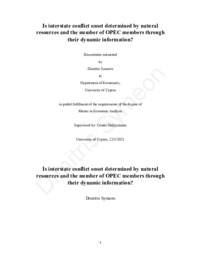| dc.contributor.advisor | Hadjiyiannis, Costas | en |
| dc.contributor.author | Symeon, Dimitris | en |
| dc.coverage.spatial | Cyprus | en |
| dc.creator | Symeon, Dimitris | en |
| dc.date.accessioned | 2022-02-16T09:51:42Z | |
| dc.date.available | 2022-02-16T09:51:42Z | |
| dc.date.issued | 2021-05-22 | |
| dc.identifier.uri | http://gnosis.library.ucy.ac.cy/handle/7/65024 | en |
| dc.description.abstract | In the paper I answer the question if the existence of natural resources increases the probability of interstate conflict onset. As main measure for the existence of natural resource, I am using the sum of oil in the dyad, measured in different ways (crude oil reserves, production, exports, net exports, and rents) and some aggregations of it (crude oil and NGPL production, and fuel exports). The methodology I use to answer the question, is the recursive bivariate probit model to analyze the empirical results by endogenizing the terms of trade in the model. As for the cases that the endogeneity is not significant, I use the pooled probit model. Also, the paper has 3 contributions in the literature. Firstly, I use the dynamics of conflict for autocorrelation in the model. Secondly, I alternative measure the existence of natural resources by the number of OPEC members in the dyad, because OPEC members are countries that export crude oil. And
thirty, I also measure the dynamic impact of the existence of natural resources on the probability of interstate onset. The empirical study includes 37,950 dyad-years that come from 275 countries and the period I analyze is from 1961-2009. From both models, I find a positive impact on interstate conflict onset from the sum of crude oil and is statistically significant. Only for the sum of the aggregation of fuel exports I do not find a statistically significant impact on interstate conflict after resolving reverse causality and endogeneity in the model. As for the non-OPEC members, the impact of the sum of oil rents on the probability of interstate conflict is statistically significant and robust as well. To overcome endogeneity and reverse causality problems in the model I am using lags on the sum of crude oil and the number of OPEC members which can be considered as a strategic oil variable (a mixture of crude oil reserves, production, and exports). There is very robust evidence that the dynamic information on the number of OPEC members increases the probability of interstate conflict onset. This variable has the most unbiased and asymptotically consistent results on the probability of interstate conflict onset. Considering the old information on the other oil variables, only the sum of crude oil net exports is statistically increasing the probability of interstate conflict onset but is not robust. And lastly, there is evidence that old information may count more than current information on the probability of interstate conflict onset. | en |
| dc.language.iso | eng | en |
| dc.publisher | Πανεπιστήμιο Κύπρου, Σχολή Οικονομικών Επιστημών και Διοίκησης / University of Cyprus, Faculty of Economics and Management | |
| dc.rights | info:eu-repo/semantics/openAccess | en |
| dc.rights | Open Access | en |
| dc.title | Is interstate conflict onset determined by natural resources and the number of OPEC members through their dynamic information? | en |
| dc.type | info:eu-repo/semantics/masterThesis | en |
| dc.contributor.committeemember | Hadjiyiannis, Costas | en |
| dc.contributor.committeemember | Andreou, Elena | en |
| dc.contributor.department | Τμήμα Οικονομικών / Department of Economics | |
| dc.subject.uncontrolledterm | INTERSTATE CONFLICT | en |
| dc.subject.uncontrolledterm | NATURAL RESOURCES | en |
| dc.subject.uncontrolledterm | DYNAMIC INFORMATION | en |
| dc.subject.uncontrolledterm | OPEC MEMBERS | en |
| dc.author.faculty | Σχολή Οικονομικών Επιστημών και Διοίκησης / Faculty of Economics and Management | |
| dc.author.department | Τμήμα Οικονομικών / Department of Economics | |
| dc.type.uhtype | Master Thesis | en |
| dc.contributor.orcid | Hadjiyiannis, Costas[0000-0002-6660-7871] | |
| dc.gnosis.orcid | 0000-0002-6660-7871 | |

